Related Research Articles

Algeria, officially the People's Democratic Republic of Algeria, is a country in the Maghreb region of North Africa. It is bordered to the northeast by Tunisia; to the east by Libya; to the southeast by Niger; to the southwest by Mali, Mauritania, and Western Sahara; to the west by Morocco; and to the north by the Mediterranean Sea. Algeria has a semi-arid climate, with the Sahara desert dominating most of the territory except for its fertile and mountainous north, where most of the population is concentrated. Spanning 2,381,741 square kilometres (919,595 sq mi), it is the world's tenth largest nation by area, and the largest nation in Africa. With a population of 44 million, Algeria is the tenth-most populous country in Africa, and the 32nd-most populous country in the world. The capital and largest city is Algiers, located in the far north on the Mediterranean coast.

Colonialism is the pursuing, establishing and maintaining of control and exploitation of people and of resources by a foreign group of people. Implemented through the establishment of coloniality and possibly colonies, this colonization keeps colonized territory and people socio-economically othered and subaltern to colonizers and their metropole. While frequently advanced as an imperialist regime, colonialism can also take the form of settler colonialism, whereby colonial settlers invade and occupy territory to permanently replace an existing society with that of the colonizers, possibly towards a genocide of native populations.

Casablanca is the largest city in Morocco and the country's economic and business centre. Located on the Atlantic coast of the Chaouia plain in the central-western part of Morocco, the city has a population of about 3.71 million in the urban area, and over 4.27 million in Greater Casablanca, making it the most populous city in the Maghreb region, and the eighth-largest in the Arab world.
February 8 is the 39th day of the year in the Gregorian calendar; 326 days remain until the end of the year.
March 28 is the 87th day of the year in the Gregorian calendar; 278 days remain until the end of the year.
November 22 is the 326th day of the year in the Gregorian calendar; 39 days remain until the end of the year.
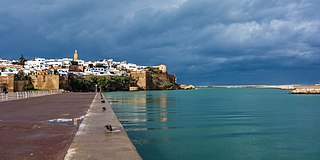
Rabat is the capital city of Morocco and the country's seventh-largest city with an urban population of approximately 580,000 (2014) and a metropolitan population of over 1.2 million. It is also the capital city of the Rabat-Salé-Kénitra administrative region. Rabat is located on the Atlantic Ocean at the mouth of the river Bou Regreg, opposite Salé, the city's main commuter town.
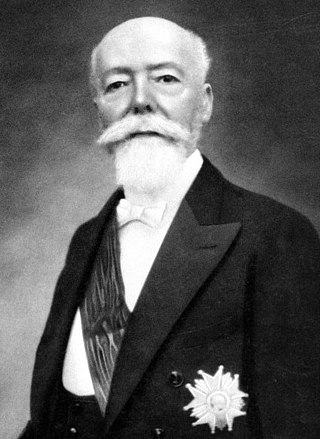
Joseph Athanase Doumer, commonly known as Paul Doumer, was a French politician who served as the President of France from June 1931 until his assassination in May 1932. He is described as "the Father of French Indochina," and was seen as one of the most active and effective governors general of Indochina.

Mohammed al-Khamis bin Yusef bin Hassan al-Alawi, better known simply Mohammed V, was the last Sultan of Morocco from 1927 to 1953 and from 1955 to 1957, and first King of Morocco from 1957 to 1961. A member of the 'Alawi dynasty, he played an instrumental role in securing the independence of Morocco from France and Spain.
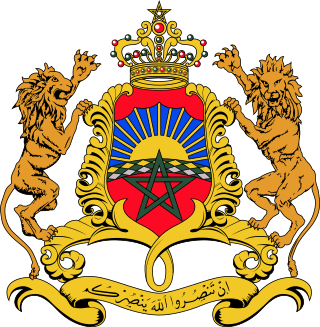
The 'Alawi dynasty – also rendered in English as Alaouite, 'Alawid, or Alawite – is the current Moroccan royal family and reigning dynasty. They are an Arab sharifian dynasty and claim descent from the Islamic prophet Muhammad through his grandson, Hasan ibn Ali. Their ancestors originally migrated to the Tafilalt region, in present-day Morocco, from Yanbu on the coast of the Hejaz in the 12th or 13th century.

Driss Chraïbi was a Moroccan author whose novels deal with colonialism, culture clashes, generational conflict and the treatment of women and are often perceived as semi-autobiographical.

Mohammed Dib was an Algerian author. He wrote over 30 novels, as well as numerous short stories, poems, and children's literature in the French language. His work covers the breadth of 19th century Algerian history, focusing on Algeria's fight for independence.
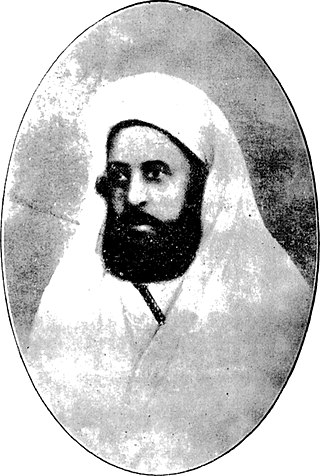
MawlayHassan bin Mohammed, known as Hassan I, born in 1836 in Fes and died on 9 June 1894 in Tadla, was a sultan of Morocco from 12 September 1873 to 7 June 1894, as a ruler of the 'Alawi dynasty. He was proclaimed sultan after the death of his father Mawlay Muhammad bin Abd al-Rahman. Mawlay Hassan was among the most successful sultans. He increased the power of the makhzen in Morocco and at a time when so much of the rest of Africa was falling under foreign control, he brought in military and administrative reforms to strengthen the regime within its own territory, and he carried out an active military and diplomatic program on the periphery. He died on 9 June 1894 and was succeeded by his son Abd al-Aziz.
Moroccan literature are the written and oral works of Moroccan culture. These works have been produced and shared by people who lived in Morocco and the historical states that have existed partially or entirely within the geographical area of modern-day Morocco. Apart from the various forms of oral literature, the written literature of Morocco encompasses various genres, including poetry, prose, theater, and nonfiction including philosphical and religious literature. Moroccan literature has mainly been written in Arabic and French, and to a lesser extent also in Berber languages, Judeo-Arabic, Spanish, and after the mid-19th century in English.[pages needed] Through translations into English and other languages, Moroccan literature has become accessible to readers worldwide.

The General Intelligence Directorate, also known as the General Security Directorate or Syrian GID, is the most important civil intelligence service of Syria and plays an important role in quelling internal dissent. The General Intelligence Directorate conducts surveillance of the Syrian population, directs foreign intelligence, and monitors activities in Lebanon.
Events from the year 1816 in France

Kamel Daoud is an Algerian writer and journalist. He currently edits the French-language daily Le quotidien d’Oran, for which he writes a popular column, "Raïna Raïkoum". The column often includes commentary on the news.
Algérianité was the conception of a unique "Algerianess" under French colonial rule in Algeria that encompassed an independence from the French identity, and the political ideal of an Algerian homeland. Algérianité conceives of Algerian identity as a unique blend of disparate influences contributed by settlers of differing cultural backgrounds. The blending of such diverse influences creates the new culture that is uniquely Algerian and this is called "Algérianité".
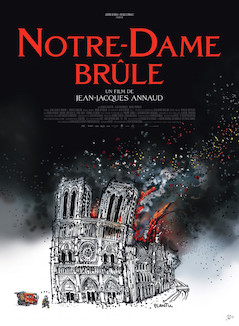
Notre-Dame on Fire is a 2022 disaster film based on the Notre-Dame de Paris fire that occurred on 15 April 2019. The film is directed by Jean-Jacques Annaud from a script written by Annaud and Thomas Bidegain. Produced by Pathé Films and TF1 Films Production, it is an international co-production with Italian company Wildside.
La Grande Maison is a novel by Mohammed Dib published in 1952 by Editions du Seuil. It is the first part of the Algeria trilogy.
References
- ↑ "L'Incendie | work by Dib | Britannica". www.britannica.com. Retrieved 2024-04-16.
- ↑ Dib, Mohammed (2002-01-11). L'Incendie (in French). POINTS. ISBN 978-2-02-048498-5.
- ↑ "Dib: The Fire". The Modern Novel. Retrieved 2024-04-16.
- ↑ "L'Incendie - Mohammed Dib". Babelio (in French). Retrieved 2024-04-16.
- ↑ Agti, Abdelaziz (2023-06-01). "Cultural hybridisation in Mohammed Dib's novel " L'incendie " ( The Fire)". معالم. 14 (1): 279–292. ISSN 2600-6944.